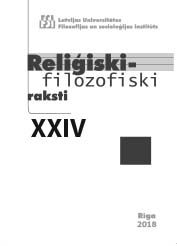Substances jēdziens un nozīme
The Concept and Meaning of Substance
Author(s): Arnis MazlovskisSubject(s): Metaphysics, Ontology
Published by: Latvijas Universitātes Filozofijas un socioloģijas institūts
Keywords: ontology; substance; Christianity; theology; metaphysics;
Summary/Abstract: In the endeavor to form a comprehensive system of knowledge, thinkers coin concepts and suggest hypotheses which are subject to critical review in the future. Some theories proposed already in classical antiquity have proved right and useful (atomic structure of matter, heliocentric planet system) while others have been discarded as based on misconceptions (e.g. phlogiston, world ether and vital force). Most contemporary philosophers reluctantly resort to metaphysical constructions, and some habitual representations allegedly prompted by common sense are open to query. In the present paper, different views on the fundamental ontological category of substance are considered. In his teaching on categories, Aristotle distinguished several meanings of substance. Individual particulars he called primary substances, and their species and kinds were named secondary substances. The substratum lacking properties and inner structure was defined as prime matter. Aristotle admitted both material and immaterial substances. In the latter class, human souls and the unmoved mover were included. Christian theologians used the concept of substance for more accurate restriction of dogmatic nuances. The similarity of Christ with the Father was designated as consubstantiality, the transformation of bread and wine in Eucharist as transubstantiation. Thomas of Aquinas arranged substances according to their essence and individuality. God’s essence necessarily includes existence whereas creatures have contingent existence. Immaterial beings only differ by species, while compound beings containing form and matter are individuated due to matter. Spinoza deemed substance as infinite in any aspect. He called it God or Nature. A single substance is solely possible. Extension and thought are attributes of the substance, particular things are modifications or modes of attributes. The Buddha denied substances. Physical formations have properties but no matter in them. Mentality is just a flow of sensations, perceptions, volitions, and cognition. Neither a substantial soul nor its immortality is recognized. However, the empirical identity of persons and its consequences: merits and responsibility, are maintained.
Journal: Religiski-filozofiski raksti
- Issue Year: XXIV/2018
- Issue No: 1
- Page Range: 105-123
- Page Count: 19
- Language: Latvian

